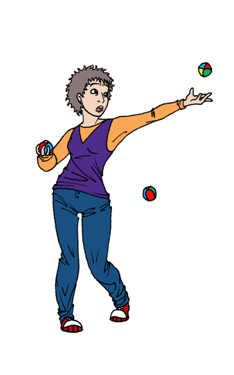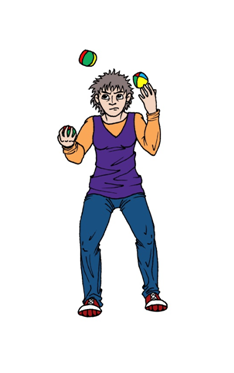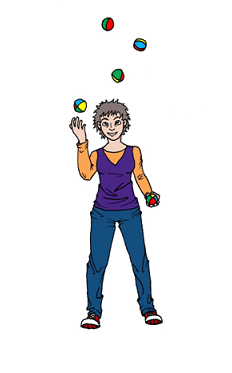Teaching Tips
1. Teaching bell handling
1.3. How long do I go on working on improving handling style
To help us as ringing teachers understand how long we should continue to work with learners we need to learn about the learning process.
Learners will need a different approach to teaching when they are at different stages of learning.
The different teaching techniques are all about coaching the learner. Because of this emphasis on coaching, the ringing teacher will be referred to as a ringing coach or coach.
As a learner becomes more skillful through practice, assisted by coaching support, three stages are passed through:
- Novice (Cognitive)
- Improver (Associative)
- Expert (Autonomous)
The Novice
During the cognitive or mental stage, the learner is attempting to understand the basic task and is figuring out the skill. They are learning to identify all the component parts of the skill and forming a mental picture of what is required.

Characteristics of the Novice
- Relevant movements to perform the skill are being assembled
- Major errors can be seen
- The style is fitful and jerky
Coaching requirements of the Novice
Basic instruction of explanation, demonstration and small step exercises to help the learner get the feeling of the actions. These will all help the learner get a mental picture of what is required. This is the time to get the foundation skills accurate. Learners are not aware of what they are doing wrong or how to correct errors.
Good feedback during this phase is important. Correct performances are infrequent at this stage and should be reinforced through external feedback and positive reinforcement from the ringing coach. Words and gestures are both relevant – a quick thumbs up can convey a lot.
The learner needs praise at this stage. This is the time the learner is ringing on an individual bell.
The Improver
This is the phase where the basic skills are becoming refined and the learner is linking the component parts into a smooth action.

Characteristics of the Improver
- Some errors are still evident
- The style is a bit hit and miss [sometimes they get it right and sometimes they get it wrong]
- The learner is starting to feel when they have got it right or wrong. They are starting to be able to correct their own errors
Coaching requirements of the Improver
This is the phase where continued feedback from the coach, coupled with frequent opportunities to practise, gradually shapes and polishes the performance of a learner. Practise on an individual bell is still important to enable feedback and reinforcement to be given. Practise of handling must be performed regularly and correctly.
Learners will be ringing on open bells and they need to ring on a variety of bells to help them develop their skills. The feedback they receive through the rope from the bell is an extremely good tutor.
The Expert
In this final stage of learning, errors are rare and performance has become consistent and fluid. The movements are well learned and stored in the long-term memory of the brain as a movement pattern. Bell handling has become automatic and involves little or no conscious effort.

Characteristics of the Expert
- Few small errors can be seen
- Fluid style
- Can transfer most learning to novel situations [the learner can cope with different bells easily]
Coaching requirements of the Expert
At this point the brain now has spare conscious capacity and it can give this spare attention to focusing on learning new things such as Call Changes, Plain Hunt and method ringing.
It should be noted that not all performers reach this stage,, which may explain why older learners who can be less coordinated than younger ringers can find it harder to develop their method ringing. They still have to use a large part of the brain to consciously control the bell!
To retain the new skilled performance at this level it must be constantly practised to reinforce the movement pattern. At this time coaches can diversify practice conditions; this is the time to take your learner on a ringing outing.
Pip Penney